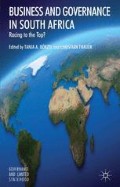Abstract
Business and government relations as well as industrial relations (such as between labor and capital) in general follow a corporatist pattern in South Africa (Adam 1998, Dunn and Donnelly 2006). Similarly to the experience in Europe (especially Germany), South African corporatism of today has its roots in past anti-liberal ideology and regime type (Murray 1982, Pretorius 2000, Streeck and Kenworthy 2003). Apartheid South Africa organized its economy based on the idea of autarchy and in a context of international isolation as a highly organized market economy (Barnes and Black 2003, Black 2001, Black and Mitchell 2002). A main organizing principle was that of racial segregation: the economy of the country depended on ‘white’ capital exploiting ‘black’ workers (Bramble and Barchiesi 2003, Lipton 1985, Murray 1982). The mining industry is illustrative in this respect. As Hönke points out in her chapter on HIV/AIDS governance, the industry was based on a racial model of migrant labor ever since the opening of the first mines in 1886 (Lipton 1985, Murray 1982). ‘Black’ Africans from all over Southern Africa were brought to the mines owned by ‘white’ settlers, as underpaid workers, separated from their families and exposed to dangerous and humiliating working conditions. The Chamber of Mines (CoM) played a key role in institutionalizing and maintaining this system.
Access this chapter
Tax calculation will be finalised at checkout
Purchases are for personal use only
Preview
Unable to display preview. Download preview PDF.
Notes
Mbeki, Thabo (2003). ‘Address by President Thabo Mbeki to the National Council of Provinces. The second economy, what it is and what is needed to meet the growth and development challenges it presents’. Available from: http://www.sarpn.org.za/documents/d0000830/index.php [accessed 27 September 2006].
Statistics South Africa (2006). Manufacturing: Production and Sales. Preliminary: June 2006. Statistical Release P3041.2. Pretoria: Statistics South Africa. Available from: http://www.statssa.gov.za [accessed 10 August 2006].
Statistics South Africa (2006). Manufacturing: Production and Sales. Preliminary: June 2006. Statistical Release P3041.2. Pretoria: Statistics South Africa. Available from: http://www.statssa.gov.za [accessed 10 August 2006].
TIPS (2005). Trade and Industrial Policy Strategies. Monthly Trade Statistics. Available from: http://www.tips.org.za [accessed 2 July 2006].
Research Report (2006). Research Report. Region: South Africa, Industry: Textiles. Market: Men, Women, Children. Abstract. Infomat, Fashion Search Engine. Available from: http://www.infomat.com/research/infre0000281. html [accessed 2 August 2006].
SouthAfrica.Info (2006). South Africa’s Textile Industry. SouthAfrica.info. The Official Gateway. Available from: http://www.southafrica.info/pls/procs [accessed 12 August 2006].
Editor information
Editors and Affiliations
Copyright information
© 2013 Jana Hönke, Nicole Kranz, Anna Kristin Müller-Debus and Christian R. Thauer
About this chapter
Cite this chapter
Hönke, J., Kranz, N., Müller-Debus, A.K., Thauer, C.R. (2013). Business, Governance and Government in South Africa: The Legacy of Apartheid. In: Börzel, T.A., Thauer, C.R. (eds) Business and Governance in South Africa. Governance and Limited Statehood Series. Palgrave Macmillan, London. https://doi.org/10.1057/9781137317810_2
Download citation
DOI: https://doi.org/10.1057/9781137317810_2
Publisher Name: Palgrave Macmillan, London
Print ISBN: 978-1-349-34505-2
Online ISBN: 978-1-137-31781-0
eBook Packages: Palgrave Political & Intern. Studies CollectionPolitical Science and International Studies (R0)

